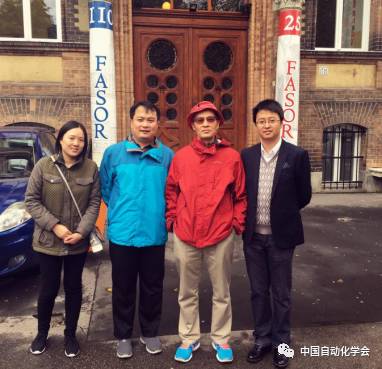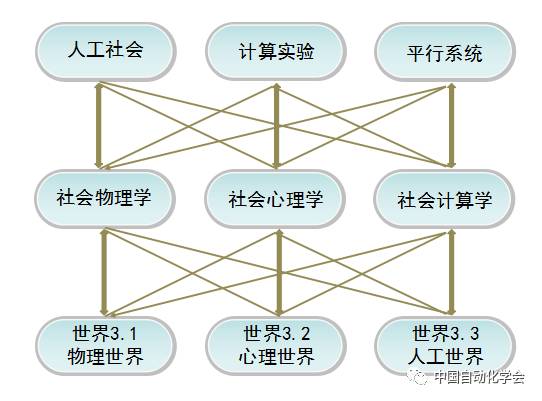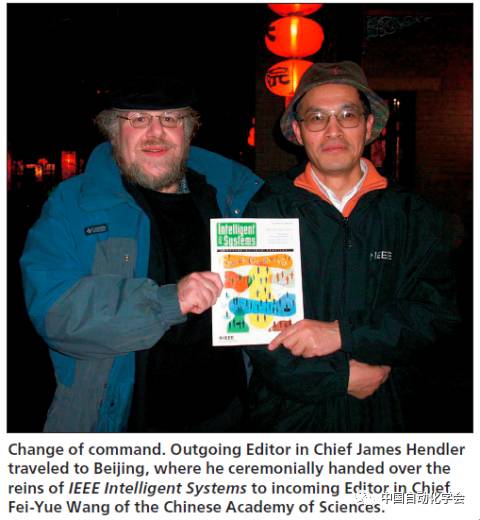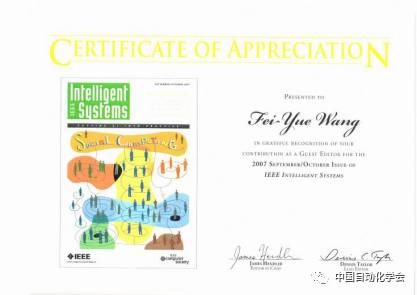近日,IEEE SMC正式批復同意成立“IEEE SMC社會計算與社會智能技術委員會(IEEE SMC Technical Committee on Social Computing and Social Intelligence)”,由中國自動化學會副理事長兼秘書長、中國科學院自動化研究所復雜系統管理與控制國家重點實驗室主任王飛躍研究員擔任首屆技術委員會主席,RPI數據探索與應用研究所所所長James Hendler與丹佛大學電子與計算機工程系主任Kimon Valavanis共同擔任聯合主席,中科院自動化研究所復雜系統管理與控制國家重點實驗室袁勇副研究員擔任秘書長。同時,王飛躍研究員當選為2017年IEEE SMC BoG (Board of Governor)成員,是當前IEEE SMC協會BoG的唯一一位中國大陸學者,任期至2019年,這將進一步促進我會與IEEE SMC的深度合作與交流。
IEEE SMC協會全稱為IEEE Systems, Man and Cybernetics Society (IEEE系統、人與控制論協會),其愿景是成為系統科學與工程、人機系統與控制論的理論與應用領域世界領先的國際學術組織。在2014年時,王飛躍研究員便因其在復雜系統的智能控制與管理方面的開拓性貢獻和杰出成就,于紀念“控制論之父”諾伯特·維納誕辰120周年時獲得IEEE SMC 諾伯特·維納獎。成為大陸首位獲此殊榮的學者。

王飛躍研究員攜團隊青年學者共同參加2016 SMC Conference,于會上提議成立IEEE SMC Technical Committee on Social Computing and Social Intelligence。圖片拍攝與布達佩斯,馮諾依曼就讀的高中。
此次由王飛躍研究員帶頭提議并成立“IEEE SMC社會計算與社會智能技術委員會”,一方面是感受到國內外學者對社會計算作為一個獨立的交叉學科的需求日趨迫切;另一方面是當前復雜系統由CPS向CPSS的范式轉移引發了極大的社會復雜性,許多傳統的研究方法已然無法發揮有效作用,必須聯合國內外各領域的廣大優秀學者,共同推動圍繞因現代信息技術引起的社會、經濟與工程系統的復雜性問題展開研究。

基于ACP(人工社會、計算實驗與平行系統,Artificial Societies, Computational Intelligence, Parallel Execution)的社會計算基本研究框架
我國學者在社會計算領域的研究工作起步較早,率先在國際上倡導并推動了社會計算學科的發展。2004年,中國科學院自動化研究所王飛躍研究員在《科學時報》上首次提出“計算社會學”的概念;2007年,王飛躍研究員等學者在人工智能領域頂級雜志《IEEE Intelligent Systems》上聯合撰文明確了“社會計算”的內涵,給出其從“社會信息”到“社會智能”的基本研究框架,并得到了國內外學者的廣泛引用;2008年中國科學院繼續設立知識創新重大項目“情報與安全信息學和社會計算的基礎理論及原型系統”項目,支持相關理論方法研究和系統研發;天津大學則在國家自然科學基金委和教育部資助下開展了針對復雜社會經濟系統的計算實驗研究;浙江大學計算機學院和社會科學基礎研究平臺也分別成立了面向社會計算的交叉學科研究隊伍;2011年中國人民大學啟動了中國人民大學重大基礎研究計劃項目“社會計算”,主要研究社會計算的若干基礎問題。


2008年冬,時任《IEEE Intelligent Systems》主編的James Hendler 教授受侯任主編王飛躍研究員邀請來到北京,部署主編交接工作。左圖為Hendler教授將《IEEE Intelligent Systems》雜志交于王飛躍研究員手中,該期雜志主題恰為“Social Computing”。王飛躍研究員因為對“Social Computing”當期雜志的突出貢獻,受雜志頒發貢獻證書,如下圖所示。
2012年,在中國科學院研究生院(即今天的中國科學院大學,簡稱國科大)的大力支持下,社會計算成為跨“控制科學與工程”、“計算機科學與技術”、“管理科學與工程”三個一級學科的交叉學科(學科代碼“99J2”),擁有博士和碩士學位授予權,學位培養工作依托國科大和中科院自動化所展開。
IEEE SMC社會計算與社會智能技術委員會的成立,為“社會計算”、“計算社會學”以及“社會智能”等相關領域學者提供了新的學術交流與探討平臺,專委會的研究方向包括但不限于:
Fundamentals of social computing and social intelligence
Modeling of social behavior
Social network analysis and mining
Big social media data
Social media infrastructure and cloud computing
Computational models of social simulation
Web 2.0 and semantic web
Innovative HCI and touch-screen models
Modelling of social conventions and social contexts
Social cognition and social intelligence
Social media analytics and intelligence
Group formation and evolution
Security, privacy, trust, risk and cryptography in social contexts
Social system design and architectures
Information retrieval, data mining, artificial intelligence and agent-based technology
Group interaction, collaboration, representation and profiling
Handheld/mobile social computing
Service science and service oriented interaction design
Cultural patterns and representation
Emotional intelligence, opinion representation, influence process
Mobile commerce, handheld commerce and e-markets
Social policy and government management
Social blog, micro-blog, public blog, internet forum
Business social software systems
Impact on peoples activities in complex and dynamic environments
Collaborative filtering, mining and prediction
Social computing applications and case studies
Knowledge Management and Automation
Blockchain and Distributed Artificial Intelligence
Applications of Social Computing for Power and Energy Systems, Smart Grid and Energy Internet
Applications of Social Computing in Unmanned Systems
Applications of Social Computing in Advanced Controls